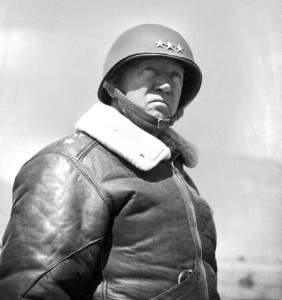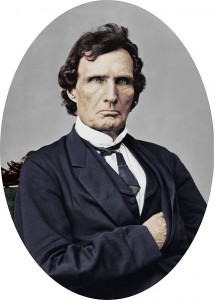
George S. Patton
General
George Smith Patton, Jr. was easily the most colorful and controversial American general of World War II. Part of the controversy around Patton concerned the fact that he could, and would, “curse like a stable-boy”. As related by Charles M. Province:
“Patton had a unique ability regarding profanity. During a normal conversation, he could liberally sprinkle four letter words into what he was saying and the listeners would hardly take notice of it. He spoke so easily and used those words in such a way that it just seemed natural for him to talk that way.
He could, when necessary, open up with both barrels and let forth such blue-flamed phrases that they seemed almost eloquent in their delivery. When asked by his nephew about his profanity, Patton remarked, “When I want my men to remember something important, to really make it stick, I give it to them double dirty. It may not sound nice to some bunch of little old ladies at an afternoon tea party, but it helps my soldiers to remember. You can’t run an army without profanity; and it has to be eloquent profanity. An army without profanity couldn’t fight it’s way out of a piss-soaked paper bag.”
“As for the types of comments I make”, he continued with a wry smile, “Sometimes I just, By God, get carried away with my own eloquence.”
Source:
[1] The Famous Patton Speech, by Charles M. Province
“I know you believe you understand what you think I said, but I am not sure you realize that what you heard is not what I meant.”
My wife and I have used this quote around our house ever since college days, when I decorated my dorm room with a poster displaying this phrase. Trying to find the source of this mind-bending tongue-twister points out the fallibility of the Internet. I see it attributed to Federal Reserve Chairman Alan Greenspan, citing an unspecified Capital Hill hearing. But I rather doubt that he is responsible for originating the phrase, since he was not nominated to the Federal Reserve until 1987, and this was hanging on my dorm room wall in 1974. Besides, Wikiquote states this is misattributed to Greenspan, and states the “earliest known print reference” to Robert McCloskey, U.S. State Department spokesman, during a Vietnam-era press briefing. That’s a possibility, as is another Vietnam-era attribution to Richard Nixon. But if we really want to go back a long ways, I see it attributed to Oscar Wilde. I kind of like that, but the Web sites devoted to Wilde do not mention it, and that does not help the credibility of this reference.
Vox’s Take: I guess I have to side with the quote sites that admit defeat and attribute it to “Unknown”, whoever he was.
Sources:
[1] Viewpoint: Alan Greenspan and the Federal Reserve, Joseph Yam
[2] Alan Greenspan, Wikiquote
[3] PUBLIC RELATIONS Quote View, Schipul, The Web Marketing Company
[4] The Official Web Site of Oscar Wilde

Thaddeus Stevens
One of the most irascible politicians of the 19th Century was the abolitionist
Thaddeus Stevens. As Chairman of the
House Ways and Means Committee during the Civil War, Stevens was one of the most powerful members of the House of Representatives and one of the leaders of the Radical Republicans. In this position, Stevens helped set much of the national policy of Reconstruction. Stevens was also known as a witty and sarcastic speaker. During a Civil War course I took, the professor related this, one of my favorite anecdotes about him:
“One day in the 1830s in the Pennsylvania Assembly, a fellow representative spoke sharply against a measure Stevens had presented. Stevens took the floor and made a short speech on the merits of the bill, completely ignoring what the prior speaker had said. As he was about to sit down, he turned to glower upon his critic and said,
“Mr. Speaker, it will not be expected of me to notice the thing which has crawled into this House and adheres to one of the seats by its own slime.” Great Leveler, by Thomas Frederick Woodley, page 10.” [1]
Sources:
[1] Thaddeus Stevens Society
[2] Thaddeus Stevens, Wikipedia

Alferd Packer in Prison
Alfred “Alferd” Packer is Colorado’s (indeed, the Nation’s) only convicted cannibal. In the winter of 1874, Alferd Packer and his companions became lost and snow-bound in the mountains near Gunnison, Colorado. In the spring, Packer emerged alone from the wilderness and was accused of murdering and eating his companions. Packer maintained his innocence, but District Court Judge Melville Gerry was unmoved. Although not supported by the official court records, legend has it that the judge told Packer at his sentencing,
“Stand up, Alferd Packer, you voracious, man-eating, son-of-a-bitch. There were seven Democrats in Hinsdale County, and you ate five of them.”
Sources:
[1] Alferd Packer, Wikipedia


